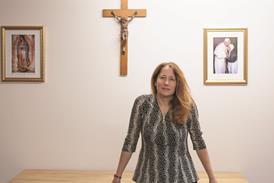When John Wooden, the legendary American basketball coach, was asked what top three traits he looked for in prospective team members, he answered simply: Talent. Talent. Talent. (In that order.) While Wooden’s criterion may have been appropriate for building a basketball team, I believe there is far more to consider when assembling a kingdom dream team.
Let me share what I look for in prospective team members at Willow Creek Community Church and at the Willow Creek Association. My selection process is based on ‘three Cs’: first character, then competence, and finally chemistry with me and with the rest of the team. Character. Competence. Chemistry. After experimenting with different selection criteria through the years, I have landed on these three in the precise order in which they are mentioned.
When searching for someone to add to a volunteer team or a paid staff position, I remind myself, Character first. By this I mean that I need to have confidence in a person’s walk with Jesus Christ. I need to know that they are committed to spiritual disciplines. I need to see evidence of honesty, teachability, humility, reliability, a healthy work ethic, and a willingness to be entreated.
Character
I didn’t always place character above competence, but I do now. I have learned that in church work an occasional lapse in competence can be accepted. But lapses in character create problems with far reaching implications. A breakdown in character tends to breed distrust and alienate team members. It also de-motivates the leader when it comes to investing time and emotional energy into that particular team member. And of course, if the leader does not deal with the wayward team member wisely, he or she may lose the respect of other team members.
A different leader might rank team selection criteria in another way, but for me it’s character first. A sailing story may help to illustrate why.
I have a sailboat racing team and one season we were short of a crewmember so we invited a new sailor to join our team. His competence was off the chart, but over time, his character became an issue. First, he was arrogant. When he met someone, his standard introductory line was, “My name is Don. The women call me Dangerous Don.” I thought our regular crewmembers were going to hang over the side and puke when they first heard that.
Over time we noticed that Don frequently fudged with the truth. Then he consistently began showing up late for practice, never offering an apology or acknowledging that he might have inconvenienced others. When small items started disappearing from the boat, I knew there was serious trouble brewing. The other guys started locking their wallets in their cars instead of leaving them in the top drawer of the galley as we had always done.
Finally, I had to pull the plug. Dangerous Don was a tremendous sailor, but his character didn’t cut the mustard.
For me, church work is no different from sailing when it comes to the issue of character. I used to think that if I discovered a potential team member who was terrifically competent but a little shaky in regard to character, I could go with the competence and address the character defects over time.
Ever the optimist, I thought that if that person were in a healthy church environment, surrounded by godly people who would hold him or her accountable, it would eventually work out.
But after 30 years of optimism I have had to admit defeat. Face it. Every adult interviewing for a key role has already spent 25, 30, 35 years in a process of character formation. Not much is going to change after that. So I look for character that has already been positively formed. (Obviously, when discipling a new Christian we need to realise that it will take time for that person’s character to conform to the image of Christ. But that’s another matter entirely; when we’re talking about forming a leadership dream team, we are most likely not talking about new Christians.)
So during the selection process I work very hard to discern a candidate’s character. I check references. I speak at length with people who know the person well. I’m looking for any red flags pursuant to issues of character. Better for me to catch inconsistencies now than force a whole team to catch them later.
What do I do if an existing team member begins to display lapses in character? I act as soon as I’m aware of a problem. I talk with the individual immediately, hoping that together we can discern the root causes of the problem. Then I ask him or her to face it, confess it, and make changes with God’s help. Often I will also suggest Christian counselling.
But if there is a continuing pattern of inconsistency, I usually ask the person to leave the team. I know that may seem extreme, but I’ve learned that it is nearly impossible for a team to fulfil its purpose when one member is involved in the difficult work of character reclamation.
When someone is asked to leave a team, our elders put together a spiritual restoration plan, offer financial assistance, and recommend continued
Christian counselling. We truly want to see the person’s character transformed through the work of God, but we have learned that significant character change rarely happens if the person remains in their staff or volunteer position. In my early days of leadership, I was extremely patient in regard to slips of character, hoping against hope that “things would just get better.” Now I know that usually doesn’t happen. The leader must take action - the sooner, the better.
Competence
My second selection criterion is competence. And I don’t apologise for shooting high. I look for the highest level of competence I can find. I ask God to help me find someone whose spiritual gifts have been developed and refined over many years. If we’re looking for someone to join our teaching team, I ask God to help us find a person with extremely strong teaching gifts, certainly someone more gifted as a teacher than I am. Several years ago when we added a new midweek teacher, I was thrilled to discover that he was an even more phenomenal teacher than I had expected. I still thank God for sending John Ortberg to us.
If I’m looking for a Director of Operations, I look for someone with monster administrative gifts and a stellar track record of performance. Years ago I realised that if I didn’t start surrounding myself with some really outstanding people I would be overwhelmed by the challenges of leading Willow. Now when I look around the table during our management team meetings I see a Harvard MBA, a Stanford MBA, one Ph.D., two individuals with law degrees, and several with master’s degrees. I am the only one seriously lacking in credentials!
Peter Drucker, the best selling management author, once told me that the team members I was looking for at that time were most likely neither unhappy nor unemployed. “If you find someone whose qualifications look good, but he or she is unhappy or unemployed, be very cautious. The kind of people you are looking for are probably making huge contributions and setting records some-where. They are probably deliriously happy and much loved by the people they work with. Go after that type. Go after proven competence.”
That was very valuable counsel which I follow to this day. It echoes the words of the Apostle Paul who insists in 1 Timothy 3:10 that every new deacon should be “first tested.” So first look for excellent character, and then shoot for the moon when it comes to competence.
Chemistry
The third ‘C’ I look for is chemistry, a relational fit with me as well as with other team members. Ken Blanchard, co-author of The One-Minute Manager, counselled me never to invite a person onto my team who doesn’t have a positive emotional effect on me the minute he or she walks into my office. I initially thought that counsel was a bit extreme. “Come on, Ken,” I challenged him, “I’m not looking for a golfing buddy. I just need a capable person to work faithfully in our church.” That was many years ago. Today I am a convert to the doctrine of chemistry. Why? Because so much of my time (except when I’m preparing sermons) is spent in team. Nearly every moment of my working day I’m sitting around a table with the elder team, the board of directors, the management team, the teaching team, the programming team, the WCA leadership team, or the international conference team. For hundreds of hours each year, I sit in small circles working on kingdom challenges with other people. I don’t know how to say this diplomatically, but it helps if I really like being with those people! So if two job candidates have equal character and competence, I’ll give the nod to the person whose personality and temperament blends with the other team members and with me.
I admit this without a hint of apology. One of the reasons I am having such a ball doing ministry these days is that finally, after almost three decades of team-building, all our major leadership teams are built according to the criteria I’ve been describing. Throughout our teams we have people with sky-high character, off- the-chart competence, and extraordinary chemistry. What’s not to like? When I go to work each day I feel like a schoolboy going out to play. But let me remind you again that it’s taken me 30 years to get to this point. So if you lead a church that is four years old and you don’t have a kingdom dream team yet, don’t despair. “Stay the course,” would be my advice, “but keep the selection bar high.”
Don’t overlook your own people
Occasionally I am asked where I find such great people to hire. My answer might be surprising. Almost 75% of our leaders have come right out of Willow.
These are people who have proven their character, competence, and chemistry fit while serving in volunteer positions within our ministry. While developing our own leaders from within has proven to be our best way to form dream teams. There are times that we, like most other churches, need to look beyond our walls for key staff. We have discovered that one of the benefits of being a member of the Willow Creek Association is the networking opportunity it affords. When church leaders gather together at conferences they are constantly rubbing shoulders with, or hearing about, potential staff members who share their vision and values. Our experience has been that even when we hire very carefully from outside, our batting average is less than 50% when it comes to creating an ideal, long-term working relationship. But when we hire from inside Willow or the WCA, that percentage jumps dramatically. The lesson is obvious: hire from within whenever you can.
Adapted and extracted with permission from Courageous Leadership, by Bill Hybels published by Zondervan 2002.
Beginning in the mid 70s Willow Creek Community Church, in the northwest suburbs of Chicago, has grown from 120 members to around 20,000 who attend its midweek and week-end services. Its seeker targeted approach and desire for authentic biblical community has been a model for many churches around the world. Founding Pastor Bill Hybels oversees a staff of around 180.



























